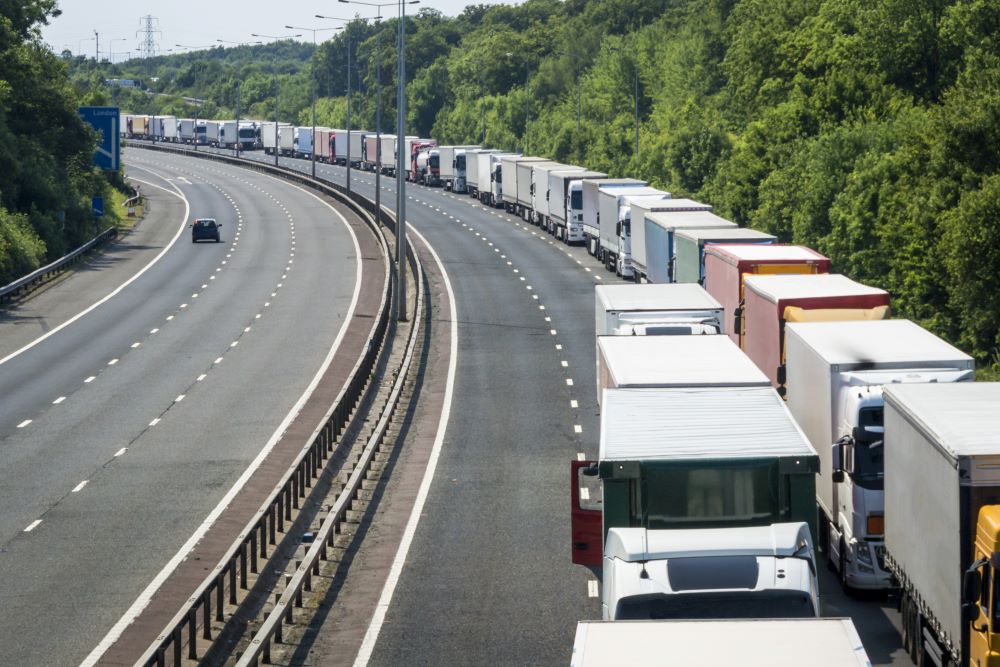
The UK’s Border Operating Model for post-transition trade has “critical gaps” creating the possibility of border chaos at the start of next year, logistics groups have warned the government in a leaked memo.
A government official’s note from a meeting with representatives of the logistics industry, reported in Bloomberg yesterday (3 September), suggests the industry is concerned that the current model for post-transition trade is “unmanageable”.
Michael Gove, the cabinet minister leading the UK’s no-deal planning, announced the Border Operating Model in July.
As part of the model, new IT platforms – including a Goods Vehicle Movement Service (GVMS) and Smart Freight System (SFS) – will be used to streamline documentary requirements for hauliers carrying goods over the border.
Unmanageable
Hauliers and freight bodies highlighted 13 key risks to ministers including a lack of contingency planning and fears the new IT systems will not be ready.
“There are up to 10 new systems that haulage firms and freight forwarders will have to navigate from 1 January, including at least three being designed now,” the memo said. “This is completely unnecessary and unmanageable with duplication and overlap.”
Letter to government
The leak came on the same day that 11 logistics industry trade bodies – including the Road Haulage Association and Logistics UK – wrote to the government voicing concerns that inadequate border preparations could lead to “severe” disruption to supply chains at the start of next year.
The letter – seen by the Financial Times – demanded an “urgent” meeting with Gove and Chancellor Rishi Sunak.
“The government often fails to grasp real-world complexities — for example, preparing existing data sets to work with customs declarations,” said a logistics expert, who is in discussions with government about the model, in the FT.
“This usually takes several months. We have 85 days and still lack basic information.”
Tech solutions
When ceasing to trade under EU rules at the end of the transition, UK firms will be faced with over 200m extra customs declarations to continue trading with the bloc.
Controls are being introduced in three phases for items coming into Great Britain from the EU over the first six months of next year, meaning declarations will not be required for standard goods imports until July 2021.
However, declarations will be required from the start of next year for UK exports to the EU and for goods moving between Britain and Northern Ireland as part of the Northern Ireland Protocol.
The government is preparing two IT systems to streamline this added documentary burden on traders and the logistics industry, including GVMS for imports and SFS for exports.
Time needed to test the IT
The freight industry has warned that the design of the systems needs to be finalized urgently so that they can be properly tested and for firms to have sufficient time to train their staff on using them.
Sarah Laouadi, European policy manager at Logistics UK, told Lloyd’s Loading List that the current government timeline for developing SFS – in which mass user-testing will be conducted in late October – does not give industry enough time to prepare.
Following testing, the likelihood is that SFS will be properly launched near to the Christmas period, which is traditionally the busiest time of the year for the industry.
“This is far too late for the thousands of companies and tens of thousands of people, who build our complex supply chains, to redesign their own processes and contractual relations before the transition ends,” she said.
“This is the worst possible time for our members to test and train staff in new working practices.”
Government response
The Cabinet Office told Bloomberg yesterday that it is working closely with the sector and will continue to do so.
It also said it is spending more on preparing border infrastructure and training customs intermediaries needed to handle the millions of extra declarations.
This includes its support of the UK Customs Academy, which reported a three-fold increase in training course bookings earlier in the summer.



